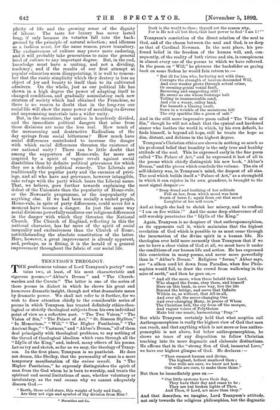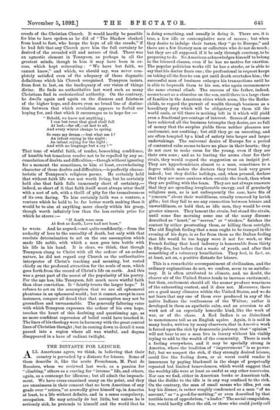TENNYSON'S THEOLOGY. T HE posthumous volume of Lord Tennyson's poetry* con-
tains two, at least, of his most characteristic and vigorous poems,—" Akbar's Dream " and " The Church- warden and the Curate." The latter is one of the series of those poems in dialect in which he shows his great and humorous dramatic insight, though not what dramatists mean by dramatic power. We shall not refer to it further, for we wish to draw attention chiefly to the considerable series of poems in which Tennyson has treated definitely ethico-theo- logical or strictly theological subjects from his own individual point of view as a reflective poet. " The Two Voices," " The Vision of Sin," " The Palace of Art," " St. Simeon Stylites," " In Memoriam," " Will," " The Higher Pantheism," " The Ancient Sage," " Vastness," and " Akbar's Dream," all of them deal principally with theological problems, to say nothing of the thread of theological idealism which runs through all the %Idylls of the King," and, indeed, many others of his poems. Let, us try and sketch, so far as we may, the theology of Tenny- son. In..the first place, Tennyson is no pantheist. He does not dream, like Shelley, that the personality of man is a mere temporary manifestation of the anima mundi. In " The Higher Pantheism," he expressly distinguishes the spirit of man from the God whom he is born to worship, and treats the spiritual and moral limitations of man, whether voluntary or involuntary, as the real causes why we cannot adequately discern God :— " Earth, these solid stars, this weight of body and limb, Are they not sign and symbol of thy division from Him 9
• Macmillan and Co.
Dark is the world to thee; thyself art the reason why, For is He not all but thou, that bast power to feel I am I P'
Tennyson's conviction of the direct relation of the soul to God, and of the chasm between the soul and God, is as deep as that of Cardinal Newman. In the next place, his pro- found belief in the freedom of the human will, and, con-
sequently, of the reality of both virtue and sin, is conspicuous in almost every one of the poems to which we have referred.
In the poem on "Will," he pictures the backslider as gazing back on some Sodom he would fain return to :-
" But ill for him who, bettering not with time,
Corrupts the strength of heaven-descended Will, And ever weaker grows through actual crime, Or seeming-genial venial fault, Recurring and suggesting still t He seems as one whose footsteps halt Toiling in immeasurable sand, And o'er a weary, sultry land, Far beneath a blazing vault, Sown in a wrinkle of the monstrous hill The city sparkles like a grain of salt."
And in the still more impressive poem called " The Vision of Sin," though he will not admit that the cynical and hardened
sinner who loathes the world in which, by his own default, he finds himself, is beyond all hope, still he treats the hope as dim, distant, and dubious in the highest degree.
Tennyson's Christian ethics are shown in nothing so much as his profound belief that humility is the only true and healthy attitude of the soul. This he expressed early in the fine poem called "The Palace of Art," and he expressed it last of all in the poems which chiefly distinguish his new book, " Akbar's Dream," and the pieces which conclude the volume. The sin of self-idolatry was, in Tennyson's mind, the deepest of all sins. The soul which builds itself a " Palace of Art," as a stronghold in which it can rejoice in its own grandeur, is brought to the most signal despair :—
" Deep dread and loathing of her solitude
Fell on her, from which mood was born Scorn of herse f ; again from out that mood Laughter at her self.scorn."
And at length she had to shriek her misery, and to confess, "I am on fire within !" And the same deep abhorrence of all self-worship penetrates the " Idylls of the King."
Again, Tennyson is no despiser of that anthropomorphism, as its opponents call it, which maintains that the highest revelation of God which is possible to us must come through the incarnation of the divine spirit in a human life. No theologian ever held more earnestly than Tennyson that if we are to have a clear vision of God at all, we must have it under the conditions of our human life and action. He has expressed this conviction in many poems, and never more powerfully than in " Akbar's Dream." Religious " forms," Akbar says, are " a silken cord let down from Paradise, when fine Philo- sophies would fail, to draw the crowd from wallowing in the mire of earth," and then he goes on,-
" And all the more, when these beheld their Lord, Who shaped the forms, obey them, and himself Here on this bank, in some way, live the life Beyond the bridge, and serve that Infinite Within us, as without, that All-in-all,
And over all, the never-changing One And ever-changing Many, in praise of Whom The Christian bell, the cry from off the mosque, And vaguer voices of Polytheism Make but one music, harmonising Pray.'"
But while Tennyson certainly held that what sceptics call Anthropomorphism is really the highest view of God that man can reach, and that anything which is not more or less anthro-
pomorphic is not above, but below anthropomorphism, he shows no trace of any disposition to follow Christian teaching into its more dogmatic and elaborate distinctions. He affirms that in the "strong Son of God, immortal Love," we have our highest glimpse of God. He declares : -
" Thou seemest human and divine,
The highest, holiest manhood thou ; Our wills are ours, we know not how ; Our wills are ours, to make them thine."
But then he immediately goes on " Our little systems have their day,
They have their day and cease to be ; They are but broken lights of Thee, And Thou, 0 Lord, art more than they."
And that describes, we imagine, Lord Tennyson's attitude, not only towards the religious philosophies, but the dogmatic
creeds of the Christian Church. It would hardly be possible
for him to have spoken as he did of " The Shadow cloaked from head to foot, who keeps the keys of all the creeds," if he had felt that any Church gave him the full certainty he
desired of the revealed will and nature of God. There was an agnostic element in Tennyson, as perhaps in all the greatest minds, though in him it may have been in ex- cess, which kept reiterating : " We have but faith, we cannot know," and which, we should say, was never com- pletely satisfied even of the adequacy of those dogmatic definitions which his Church recognised. Tennyson insists, from first to last, on the inadequacy of our vision of things divine. He finds no authoritative last word such as many Christians find in ecclesiastical authority. On the contrary, he dwells again and again on the dimness and faintness of the higher hope, and draws even no broad line of distinc- tion between that which revelation appears to forbid our hoping for, and that which it encourages us to hope for :- " Behold, we know not anything ; I can but trust that good shall fall At last,—far off,—at last to all, And every winter change to spring.
So runs my dream :—but what am I?
An infant crying in the night : An infant crying for the light : And with no language but a cry ? "
That tone of wistful faith, of tender, beseeching confidence, of humble but tenacious resolve not to be repelled by any ac- cumulation of doubts and difficulties,—though without ignoring for a moment the sometimes, to him at least, overwhelming character of these doubts and difficulties,—is perfectly charac- teristic of Tennyson's religious poems. He certainly held that without faith life was not worth living, but he certainly held also that faith falls immensely short of certainty,— indeed, so short of it that faith itself must always utter itself with a sort of sob, with a thrill of pity for the tremulousness of its own daring. To him certainly faith was a venture, a venture which he held to be far better worth making than it would be to aim at anything more clearly within his grasp, though worth infinitely less than the less certain prize for which he strove :— "If death were seen At first as death, Love had not been," he wrote. And he argued,—not quite confidently, —from the audacity of love to the unreality of death, but only with that resolute determination to act on the one assumption which made life noble, with which a man goes into battle with his life in his hand. It is clear, we think, that though Tennyson clung to Christ with all the ardour of an ardent nature, he did not regard any Church as the authoritative interpreter of Christ's teaching and meaning, but rested chiefly on the profound attraction for the souls of men, which goes forth from the record of Christ's life on earth. And this was a great part of the secret of the popularity of his poetry.
For the age has, like Tennyson, felt much more wistful faith than clear conviction. It " faintly trusts the larger hope." It refuses to act on the assumption that we are all ephemeral phantoms in an ephemeral world ; but it cannot, except in rare instances, conquer all dread that that assumption may not be groundless and unreasonable. The generally faltering voice with which Tennyson expresses the ardour of his own hope, touches the heart of this doubting and questioning age, as no more confident expression of belief could have touched it. The lines of his theology were in harmony with the great central lines of Christian thought ; but in coming down to detail it soon passed into a region where all was wistful, and dogma disappeared in a haze of radiant twilight.























































 Previous page
Previous page